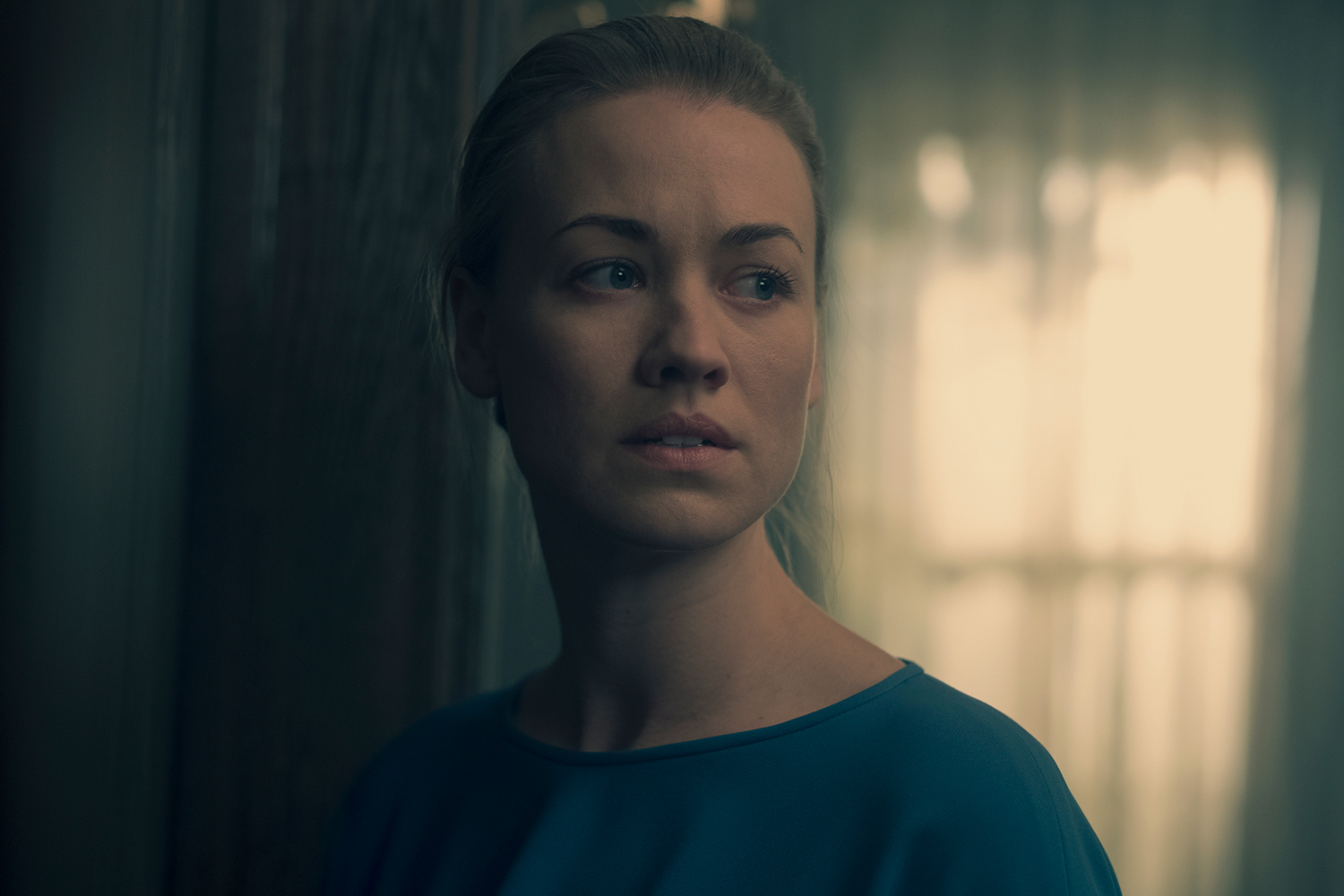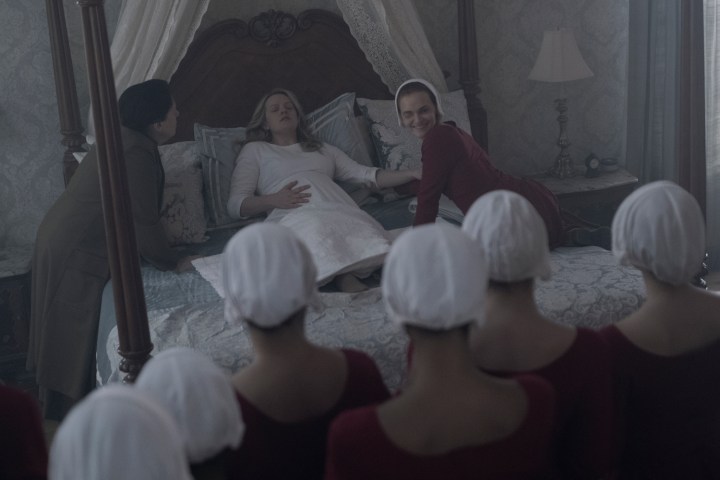If you want to know why your heart felt like it stopped a few times while watching the latest episode of The Handmaid’s Tale, look no further than the episode’s writer, Yahlin Chang.
(Spoiler alert: Make sure you watch the June 20 episode of the series before reading this article.)
In a second season that has already involved a suicide bombing, lynchings, and a cruelly satisfying Marisa Tomei death, The Last Ceremony plunges the dystopian drama to new depths of depravity. The 10th episode of season 2 has Offred’s false labor set in motion a vicious chain of events that results in her being raped and later being reunited with her daughter, Hannah.
Chang spoke with Digital Trends ahead of the show’s airing about how the United Nations helped her write the reunion scene, why she wanted to remind the audience of the extent of that world’s inhumanity, and the joy she hopes to see in season 3.
Digital Trends: You’ve written two of the most heart-wrenching scenes in Handmaid’s Tale history. The first was the reunion between Offred and her daughter, Hannah, who is taken from her in the series’ pilot episode. How did you go about writing a scene that fans have been waiting to see for more than a year?

Yahlin Chang: That scene, the Hannah-June reunion, I did a lot of research for. I talked to social workers, child psychologists, and people at the U.N. Unfortunately, mothers and children get separated all the time. [There are] moms whose kids were taken away from them because of drugs or other problems, then they get together for supervised visits. I would talk to social workers about what that’s like. [When] you haven’t seen your kid in three years, what’s it like when they come back together? Then I spoke to someone at the U.N. about what happened in war zones when the parents are going to be taken off and shot, and they have this one last chance to say goodbye to their children. What happened there?
This is the last time she saw her mother, so she’s just replaying this horrible memory.
Unfortunately, this scenario plays out all the time, and we’re even seeing that now with what’s happening at the border with mothers being ripped away from their children. It’s actually happening.
First of all, they said it never goes the way the mom wants it to go. So you have this idea that you and the child are going to run to hug each other, and it’s all going to be amazing. They said the child would usually be overwhelmed and scared. That’s why, when [Hannah] gets hugged by her mother, she runs and hides behind her [guardian]. One of the things they said was that the child is going to think about the last time she saw her mom. For Hannah, it was being ripped away from her mom at the beginning of the pilot. So that’s why she asked, “Did it hurt?” That’s when Offred realizes, “Oh my god, she’s been going over this in her head a million times.” This is the last time she saw her mother, so she’s just replaying this horrible memory.
Did you weigh in on the decision that Hannah would reunite with June or was that from The Handmaid’s Tale showrunner Bruce Miller?
Oh, that was 100-percent Bruce Miller. I think he was in Toronto, and he called on the speakerphone and said, “Listen, I think Hannah and June should meet and have a reunion. They should have a scene together.” We were like, “What?!” He blew our minds in the writers’ room [Laughs].

I was so lucky that I got to write [that episode]. How it happened and why it happened all came after that. He was like, “However that scene would actually play out in real life, let’s just play it out. Let’s play it through to the end. Let’s let it go.”
The other scene that will have people shocked is the ‘ceremony’ scene between Fred Waterford and a very pregnant Offred. Why bring the ceremony back? Is there anything that the director depicted on the screen that kind of surprised you?
I thought the director and the actors did a really brilliant job of that scene. I wanted to write that scene because I thought it was what would happen. I thought Serena and Fred [Waterford] would be really upset and humiliated once the false labor happened. They would feel like the only way to get their dignity back is for that baby to come. So how can they get the baby to come when the doctor won’t induce? When you’re super late in your pregnancy and you really want the baby to come, every pregnant couple knows that at the very end, one of the ways to get the baby to come is to have sex.
What’s important there is that the whole system of Gilead is built on rape, as well as the idea that a handmaid’s body is not her own. It belongs to the commander and his wife, and it is purely for them. … Offred is sort of out of practice. She’s usually able to dissociate successfully before the rape happens. All the handmaids are taught to think, “It’s not me. It’s not my body.” She hasn’t done it in a while, though. She’s really experiencing it.
To me, it’s important to show that no matter what the ceremony is, no matter what bullshit you put on top of it, it’s always this bad. It is always this brutal. Let us not forget that it is rape. All the handmaids are being raped every single month, and it is that terrible, and it’s just that they’re taught to hide it. They’ve been taught to make it easy on their perpetrators by not reacting, but that is what they’re going through. It’s like the brutality of that scene is what they’re experiencing at every single ceremony. Offred is too pregnant to not experience that. In some way, that is the most honest ceremony we’ve had, because it really shows that it is rape.
Otherwise, it gets sort of normalized …
Joseph Fiennes, who plays Fred Waterford, spoke with us about how difficult it was filming that scene which eventually led to Offred’s reunion with her daughter. How difficult was it for you to write it?
“It was very difficult to write the reunion scene because I had to really imagine what if this were my kid.”
Well, yeah, it was difficult to write that. [Laughs] It was very difficult to write the reunion scene because I had to really imagine if this were my kid. It was definitely difficult to write that. But, I was happy that I was writing the truth. What I was trying to do was write the truth of the experience of sexual assault. I feel like it’s important to honor the people who have gone through it — to be honest about how terrible and brutal it is. I think it’s brilliant the way that both Yvonne [Strahovski, who plays Serena] and Joseph played that scene, because you can tell that they were not expecting Offred to fight. They’ve had a million ceremonies with her. Serena comes to really regret it. Fred’s obviously affected so much that he arranged [the reunion]. The one thing Offred’s been asking to do is see Hannah, and out of guilt, Fred arranges it.
Speaking of Strahovski’s portrayal of Serena Waterford, that character has much more complexity in season 2 than she did in season 1. This season, she appears to experience moral dilemmas about the choices she’s making, and even sort of teams up with Offred for an episode. How did the writers’ room approach Serena’s complexity for this season?
Part of it is Yvonne Strahovski’s brilliant acting. She plays Serena with this real humanity where you really feel for her. It’s bizarre. [Laughs]. She does a whole lot of unforgivable things, though. She’s created this world. She’s created her own prison. She’s suffering the consequences of building her own prison. She’s much more interesting than just your typical villain because there is something really human in her.

But all this terrible behavior is very human. With everything going on in the world, one of the things we used to say in the writer’s room is “the world is more horrible than our show.” Obviously, humans are capable of awful, awful things.
The mythology of Gilead expands a bit in this episode when we learn about a character who is promoted in the government to Commander of Hearts simply because his wife was able to get pregnant without the help of a handmaid. Did the show add that layer to Gilead or was that already there in the book?
That wasn’t in the book. We wanted Fred to feel inferior in that moment because it’s supposed to be a celebration of Fred’s handmaid giving birth. This is supposed to be a huge milestone for him. What happens is this young upstart commander comes in and rains on his parade. To me, Fred feels outclassed and upstaged because there’s a potential future in which he’s going to be rendered obsolete. He’s going to be an old, decrepit commander with an infertile wife and a handmaid. He’s going to be displaced by these young upstart commanders who are able to get their wives pregnant when Fred hasn’t been able to do that.
Were there any pieces of dialogue, or anything from your script that didn’t make the final version of the episode?
That’s a good question. When we ordered the episode to figure out how many days it would take to shoot it, there was an Emily storyline that we moved because there wasn’t enough room in the episode. What’s really amazing about the show is that it’s done so well, and so efficiently, and the production is so well managed, that we use everything we shoot. I’ve been on lots of other shows where you shoot all this stuff and there are days where it all ends up on the cutting room floor. That doesn’t happen with this show. We write it, we shoot it, and we put it on the air.
What do you hope to see in season 3? Have you already started talking about it?
We convened in the writers’ room two or three weeks ago about season 3. There is that feeling at the end of episode 10 that feels like a season finale. One of the things I love about the show as a writer is how rhythmically off it is. It has a different rhythm than other shows, because on other shows that would be the season finale. But on this show, you still have three more episodes.
So we’ve just started preliminary talks about season 3. All I can say is I’m super excited. Whatever we do is going to be really surprising and shocking.
What would you hope, as a viewer and a writer, to see in season 3?
I think we’re going to see uplifting moments in season 3. That is what I’m hoping to see in season 3.
The Handmaid’s Tale is currently in the midst of its second season on Hulu.





